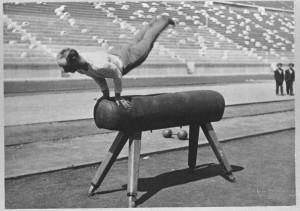 thinking: What does a boy on a cot have to do with anything?
thinking: What does a boy on a cot have to do with anything?But it’s 1984 that comes back to me, every time I hear the Olympic music or see the signature colored rings. I remember a hot summer evening, sitting on the family room floor with knees dirty from tumbling in the grass and climbing trees, eating a plate of tomatoes sprinkled with salt, watching the gymnastics competition.
The acrobatics were spectacular, but it was Mary Lou Retton’s story that I couldn’t get enough of. In the months following the Olympics, I read everything I could find about her, and I still remember reading about her tiny coal-mining hometown, how she had knee surgery just before the Olympics and all hope seemed lost that she would compete, and how she was always a gopher, running errands for her family, and it’s how she got such strong legs. (I was suddenly way more eager to run to the corner store for my mom.) It wasn’t just Mary Lou though—it was the whole American team. Their ponytails and grace and looks of determination: I was captive to all of it.
But four years later, I was getting ready to start high school, and a captive of a different kind. Then by the summer of 1992, I was about to start college, and my brain wasn’t really tuned into the rest of the world. In 1996, I got to experience the amusing British commentary from the rec room at Kings College in London, where I was doing a summer program. I was about to start graduate school, and it was my first stop on the road to independence.
In 2000 and 2004, I was busy with career- and life-building: dating people, starting my freelance business, and finally feeling like an adult. And all I really remember about 2008 is thinking that if I was in Beijing, I wouldn’t have to be home with my days-old baby. I was in a post-partum blur, and I distinctly remember thinking that it wasn’t fair that Bob Costas didn’t have to breastfeed in the middle of the night.
Making Lenses
And that brings us to today, and these past few weeks. It occurred to me this week that I have used the Olympics as a kind of marker for my life (way to make all of the athletes’ crazy hard work all about me, I know). But I have. Every four years, it’s something else in my life: a high school graduation, a job, a baby, a dream. As I watch this year, mostly what I’m thinking about is parenthood—because I’m a parent now and I get a little piece of how cool it would be to see your kid competing at that level (and how heartbreaking to watch them falter). It’s a totally different experience than watching as a girl with big eyes and an open book of dreams. I understand a different way of evaluating what’s going on.
Every four years, this thing happens and comes into our living rooms, and we’re somewhere else in our lives.I was so different back then, we say. I didn’t know what was going on during that time in my life, we say. I see things so differently now, we think. We always have a different lens.
Ritual—whether it’s your personal ritual or a ritual of the world—is an opportunity to stack your lenses. When your life bumps up against the constant of a ritual, you get perspective that you miss in a world of variables. And you really, really need that.
Over the course of it, you will probably be the same. I am still exactly the same as I was 28 years ago: a story and a look of determination still captivates me. But the opportunity is in the lens: to see something a certain way at a certain time, which can lead you to a certain path.
We watch the Olympics for the spectacular performances, and to see the best of the best. But we watch for the ritual, too. Ritual is like a growth chart. It matters deeply because it marks us.
You don’t need an Olympic committee for this. Read the same book every year, visit the same spot, take the same journey—whatever it is, just create a lens-maker that will give you insight.
Comments
Posted by GuestRoogyZH on 03/27/17 9:51am
guest test post
bbcode
html
http://googlee.te/ simple

